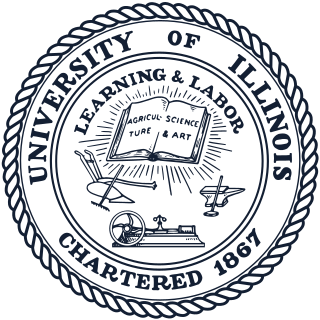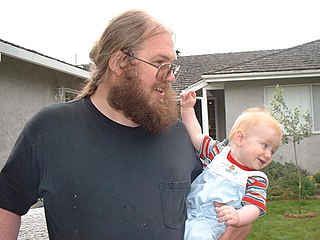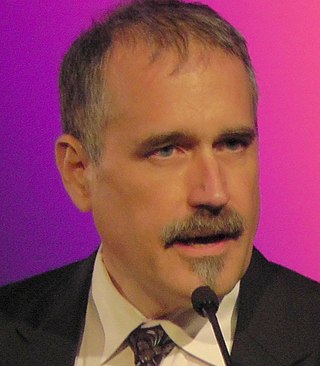Related Research Articles

The University of Illinois Urbana-Champaign is a public land-grant research university in the Champaign–Urbana metropolitan area, Illinois, United States. It is the flagship institution of the University of Illinois system and was established in 1867. With over 53,000 students, the University of Illinois is one of the largest public universities by enrollment in the United States.

The Beckman Institute for Advanced Science and Technology is a unit of the University of Illinois Urbana-Champaign dedicated to interdisciplinary research. A gift from scientist, businessman, and philanthropist Arnold O. Beckman (1900–2004) and his wife Mabel (1900–1989) led to the building of the Institute which opened in 1989. It is one of five institutions which receive support from the Arnold and Mabel Beckman Foundation on an ongoing basis. Current research at Beckman involves the areas of molecular engineering, intelligent systems, and imaging science. Researchers in these areas work across traditional academic boundaries in scientific projects that can lead to the development of real-world applications in medicine, industry, electronics, and human health across the lifespan.

Thomas Shi-Tao Huang was a Chinese-born American computer scientist, electrical engineer, and writer. He was a researcher and professor emeritus at the University of Illinois at Urbana-Champaign (UIUC). Huang was one of the leading figures in computer vision, pattern recognition and human computer interaction.

David A. Forsyth is a South-African-born American computer scientist and the Fulton Watson Copp Chair in Computer Science the University of Illinois at Urbana–Champaign.
Wen-mei Hwu is the Walter J. Sanders III-AMD Endowed Chair professor in Electrical and Computer Engineering in the Coordinated Science Laboratory at the University of Illinois at Urbana-Champaign. His research is on compiler design, computer architecture, computer microarchitecture, and parallel processing. He is a principal investigator for the petascale Blue Waters supercomputer, is co-director of the Universal Parallel Computing Research Center (UPCRC), and is principal investigator for the first NVIDIA CUDA Center of Excellence at UIUC. At the Illinois Coordinated Science Lab, Hwu leads the IMPACT Research Group and is director of the OpenIMPACT project – which has delivered new compiler and computer architecture technologies to the computer industry since 1987. From 1997 to 1999, Hwu served as the chairman of the Computer Engineering Program at Illinois. Since 2009, Hwu has served as chief technology officer at MulticoreWare Inc., leading the development of compiler tools for heterogeneous platforms. The OpenCL compilers developed by his team at MulticoreWare are based on the LLVM framework and have been deployed by leading semiconductor companies. In 2020, Hwu retired after serving 33 years in University of Illinois at Urbana-Champaign. Currently, Hwu is a Senior Distinguished Research Scientist at Nvidia Research and Emeritus Professor at University of Illinois at Urbana-Champaign.
Jiawei Han is a Chinese-American computer scientist and writer. He currently holds the position of Michael Aiken Chair Professor in the Department of Computer Science at the University of Illinois at Urbana-Champaign. His research focuses on data mining, text mining, database systems, information networks, data mining from spatiotemporal data, Web data, and social/information network data.
Chung Laung Liu, also known as David Liu or C. L. Liu, was a Taiwanese computer scientist. Born in Guangzhou, he spent his childhood in Macau. He received his B.Sc. degree in Taiwan, master's degree and doctorate in the United States.
Douglas L. Jones is the William L. Everitt Distinguished Professor of Electrical and Computer Engineering at the University of Illinois Urbana-Champaign.
Mustafa Tamer Başar is a control and game theorist who is the Swanlund Endowed Chair and Center for Advanced Study Professor of Electrical and Computer Engineering at the University of Illinois at Urbana-Champaign, USA. He is also the Director of the Center for Advanced Study.

Alan Conrad Bovik is an American engineer, vision scientist, and educator. He is a professor at the University of Texas at Austin (UT-Austin), where he holds the Cockrell Family Regents Endowed Chair in the Cockrell School of Engineering and is Director of the Laboratory for Image and Video Engineering (LIVE). He is a faculty member in the UT-Austin Department of Electrical and Computer Engineering, the Machine Learning Laboratory, the Institute for Neuroscience, and the Wireless Networking and Communications Group.
Ilesanmi Adesida is a Nigerian American physicist of Yoruba descent. He has been the provost at Nazarbayev University in Astana, Kazakhstan, from September 2016.

Rashid Bashir is Dean of The Grainger College of Engineering, Grainger Distinguished Chair in Engineering and Professor of Bioengineering, at the University of Illinois at Urbana-Champaign. He was the Executive Associate Dean and Chief Diversity Officer at the Carle-Illinois College of Medicine at UIUC. Previously, he was the Abel Bliss Professor of Engineering.

Rob A. Rutenbar is an American academic noted for contributions to software tools that automate analog integrated circuit design, and custom hardware platforms for high-performance automatic speech recognition. He is Senior Vice Chancellor for Research at the University of Pittsburgh, where he leads the university's strategic and operational vision for research and innovation.

Shrikanth Narayanan is an Indian-American Professor at the University of Southern California. He is an interdisciplinary engineer–scientist with a focus on human-centered signal processing and machine intelligence with speech and spoken language processing at its core. A prolific award-winning researcher, educator, and inventor, with hundreds of publications and a number of acclaimed patents to his credit, he has pioneered several research areas including in computational speech science, speech and human language technologies, audio, music and multimedia engineering, human sensing and imaging technologies, emotions research and affective computing, behavioral signal processing, and computational media intelligence. His technical contributions cover a range of applications including in defense, security, health, education, media, and the arts. His contributions continue to impact numerous domains including in human health, national defense/intelligence, and the media arts including in using technologies that facilitate awareness and support of diversity and inclusion. His award-winning patents have contributed to the proliferation of speech technologies on the cloud and on mobile devices and in enabling novel emotion-aware artificial intelligence technologies.

Bruce Edward Hajek is a Professor in the Coordinated Science Laboratory, the head of the Department of Electrical and Computer Engineering, and the Leonard C. and Mary Lou Hoeft Chair in Engineering at the University of Illinois Urbana–Champaign. He does research in communication networking, auction theory, stochastic analysis, combinatorial optimization, machine learning, information theory, and bioinformatics.

Yurii Vlasov is a John Bardeen Endowed Chair in Electrical and Computer Engineering and Physics at the University of Illinois Urbana–Champaign (UIUC).

Yong Rui is the chief technology officer and senior vice president of Lenovo Group. He is in charge of Lenovo's technical strategy, research and development directions, and Lenovo Research, one of Lenovo's most important innovation engines.
Stephen E. Levinson is a professor of Electrical and Computer Engineering at the University of Illinois at Urbana-Champaign (UIUC), leader of the Language Acquisition and Robotics Lab at UIUC, and a full-time faculty member of the Beckman Institute for Advanced Science and Technology at UIUC. He works on speech synthesis, acquisition and recognition and the development of anthropomorphic robots.
Xiuling Li is a distinguished electrical and computer engineering professor in the field of nanostructured semiconductor devices. She is currently the Temple Foundation Endowed Professorship No. 3 in Electrical and Computer Engineering and Fellow of the Dow Professor in Chemistry at the University of Texas at Austin. Previously, she was a Donald Biggar Willet Professor in Electrical and Computer Engineering and Interim Director of the Nick Holonyak Jr. Micro and Nanotechnology Laboratory at the University of Illinois at Urbana-Champaign.
Martin Ding Fat Wong is an American and Chinese computer scientist, electrical engineer, and university administrator. He is the Provost of the Hong Kong Baptist University (HKBU). Wong is known for his contributions to computer-aided design of integrated circuits.
References
- ↑ "Patent Database Search Results: IN/Smaragdis in US Patent Collection". patft.uspto.gov. Retrieved 2019-10-17.
- ↑ "Illinois School of Music Announces New Degree Program in Computer Science and Music (CS + Music) | Music at Illinois". music.illinois.edu. Retrieved 2019-10-17.
- ↑ Review, Technology. "2006 Young Innovators Under 35". MIT Technology Review. Retrieved 2019-10-17.
- ↑ "2015 elevated fellow" (PDF). IEEE Fellows Directory.
- ↑ "Smaragdis named an IEEE Fellow" . Retrieved August 30, 2019.
- ↑ "Distinguished Promotions – Office of the Provost". provost.illinois.edu. Retrieved 2019-10-17.
- ↑ "mlsp2017::home". 2018-11-24. Archived from the original on 2018-11-24. Retrieved 2019-10-17.
- ↑ "IEEE Signal Processing Society Best Paper Award" (PDF).